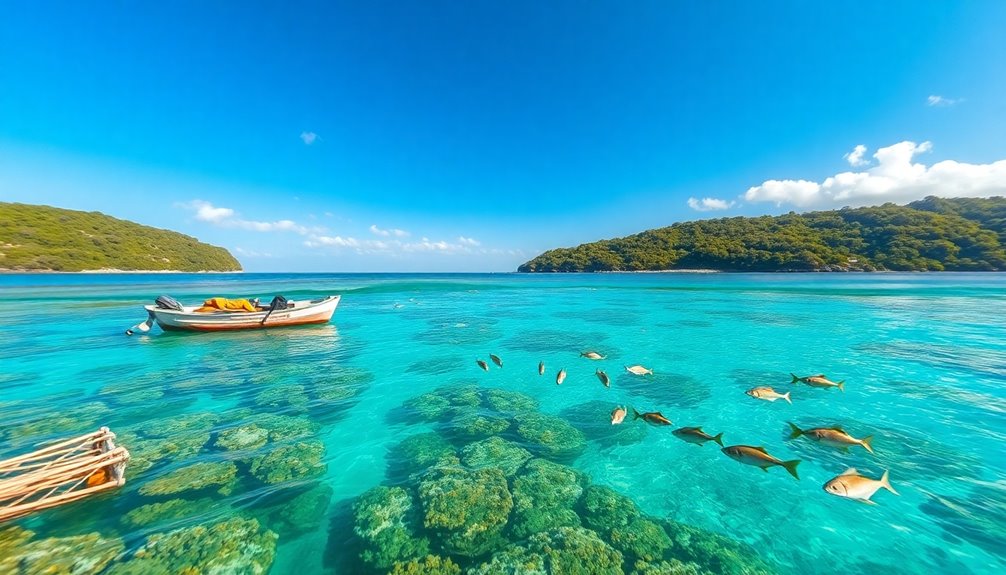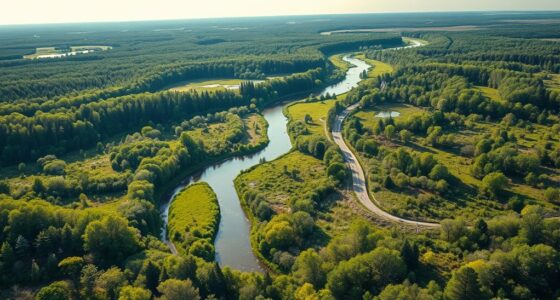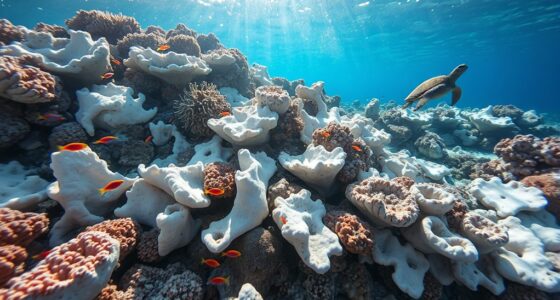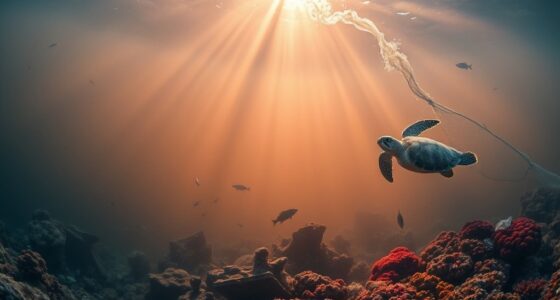Overfishing isn't an eco-friendly path; it actually threatens marine ecosystems. When fish populations are depleted faster than they can regenerate, it disrupts the balance of ocean life. Misconceptions about fishing can lead to unsustainable practices that favor short-term profits. To truly support ocean health, it's crucial to adopt sustainable seafood practices, advocate for better regulations, and prioritize ecological responsibility. There's much more to uncover about the impact of our choices on marine environments.
Key Takeaways
- Overfishing is often mistakenly viewed as eco-friendly, but it disrupts marine ecosystems and depletes fish populations faster than they can regenerate.
- Unsustainable fishing practices driven by economic gain threaten the balance of marine life, leading to long-term ecological damage.
- Technological advancements and fishing subsidies increase efficiency but contribute to overfishing, prioritizing short-term profits over sustainability.
- Marine Protected Areas (MPAs) and responsible sourcing are essential for restoring ecosystems and allowing fish populations to recover.
- Advocating for better regulations and making informed seafood choices can help combat the overfishing crisis and promote ocean health.
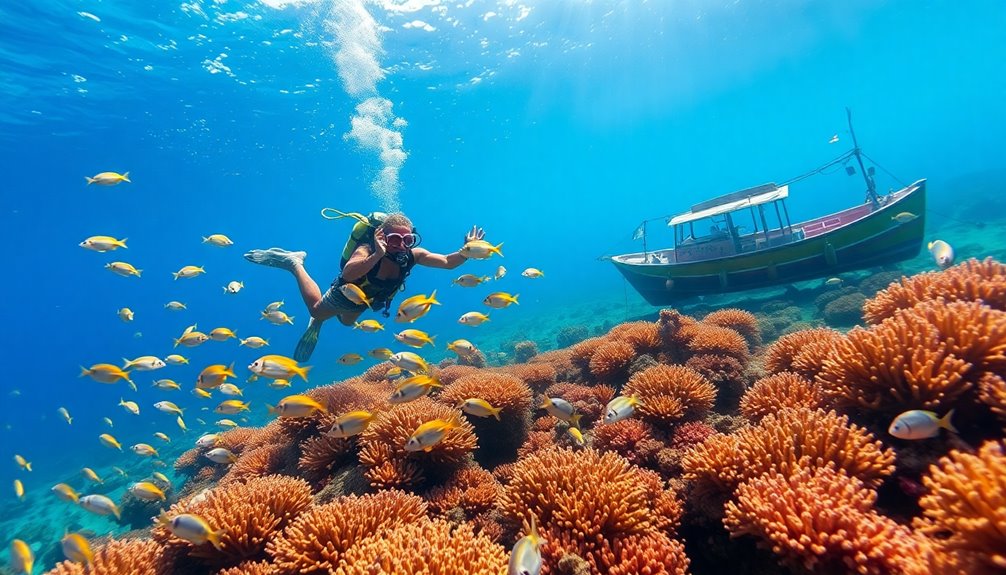
While you might think that fishing is an eco-friendly practice, the reality is quite different. Overfishing threatens marine ecosystems, depleting fish populations faster than they can regenerate. Many people wrongly assume that fishing has minimal environmental impact, but this misconception stems from a lack of understanding about how overfishing disrupts the delicate balance of marine life.
Fishing is often seen as eco-friendly, yet overfishing devastates marine ecosystems, disrupting the balance of life beneath the waves.
The pressures of economic gain often drive fishing practices that prioritize short-term profits over long-term sustainability. Fishing subsidies make it cheaper for fleets to operate beyond sustainable limits, exacerbating the problem. With technological advancements increasing efficiency, boats can catch more fish than ever before, leading to severe depletion of fish stocks. Without effective regulations and enforcement, overfishing continues unchecked, harming not just fish populations but entire ecosystems.
The effects of overfishing ripple through marine environments. As predators decline, prey species can explode in population, creating imbalances that disrupt coral reefs and other vital habitats. Grazing fish populations diminish, paving the way for harmful algal blooms that choke reefs, further reducing biodiversity. The consequences extend beyond the immediate marine life, impacting ocean chemistry and carbon sequestration capabilities, which are crucial for combating climate change. Overfishing threatens marine biodiversity, with 80% of ocean life at risk due to unsustainable fishing practices.
To address this crisis, sustainable seafood practices are essential. They can help balance economic needs with ecological responsibility, ensuring that fishing can be a viable practice without causing harm. Marine Protected Areas (MPAs) can also play a significant role in restoring damaged ecosystems, allowing fish populations to recover and thrive.
As you consider your role in this issue, remember that supporting sustainable fishing practices can make a difference. By choosing responsibly sourced seafood and advocating for better regulations, you can contribute to the health of our oceans.
It's time to shift the narrative around fishing and recognize that true eco-friendliness lies in sustainability, not depletion.
Frequently Asked Questions
What Are the Long-Term Effects of Overfishing on Marine Ecosystems?
Overfishing severely disrupts marine ecosystems, leading to a cascade of negative effects.
You'll notice the loss of key species, which throws food chains out of balance. Predator populations decline as their prey becomes scarce, resulting in overpopulation of certain species. This imbalance affects habitat structures and reduces overall biodiversity.
Additionally, the economic implications hit local communities hard, threatening jobs and cultural practices tied to fishing. The long-term consequences can be devastating for both nature and people.
How Can Consumers Identify Sustainably Sourced Seafood?
Imagine diving into a sea of vibrant colors, where fish swim freely.
To find sustainably sourced seafood, look for labels like the Marine Stewardship Council or Aquaculture Stewardship Council. They're your guiding stars, ensuring the seafood's caught or farmed responsibly.
Also, check out Seafood Watch for ratings and the Friend of the Sea label.
What Role Do Fishing Quotas Play in Sustainable Practices?
Fishing quotas play a crucial role in sustainable practices by regulating catch limits to prevent overfishing. They help maintain fish populations, ensuring long-term ecological balance.
By stabilizing income for fishing communities, quotas support economic viability while promoting biodiversity conservation.
You can encourage this sustainability by choosing seafood from fisheries that adhere to quota systems, which are backed by legal frameworks designed to enforce responsible fishing and protect marine ecosystems.
Are There Successful Case Studies of Overfishing Recovery?
Did you know that Marine Protected Areas (MPAs) have resulted in up to a 600% increase in fish biomass in some regions?
Success stories abound, like the Lyme Bay Fisheries, where banning mobile gear fishing led to habitat recovery.
Similarly, Pacific Island reserves have revitalized local fish populations through community management.
These examples show that with effective strategies and community involvement, recovering overfished areas isn't just possible—it's already happening.
How Does Overfishing Impact Local Fishing Communities Economically?
Overfishing significantly impacts local fishing communities economically. As fish stocks decline, you'll notice lower catches, resulting in reduced income for you and your fellow fishermen.
Job losses in the fishing industry ripple through related sectors, like processing and tourism, affecting your community's overall stability. With rising prices and scarce fish, food insecurity becomes a pressing issue, making it harder for you and your neighbors to thrive and support local businesses.
Conclusion
In the end, navigating the waters of overfishing can lead to surprising outcomes. By embracing sustainable practices, you can turn the tide for our oceans while still enjoying the bounty they offer. It's a delicate balance, but you have the power to make choices that protect marine life and promote eco-friendly fishing. So, let's work together to ensure our seas remain vibrant and full of life—because when it comes to the ocean, every little bit helps.
